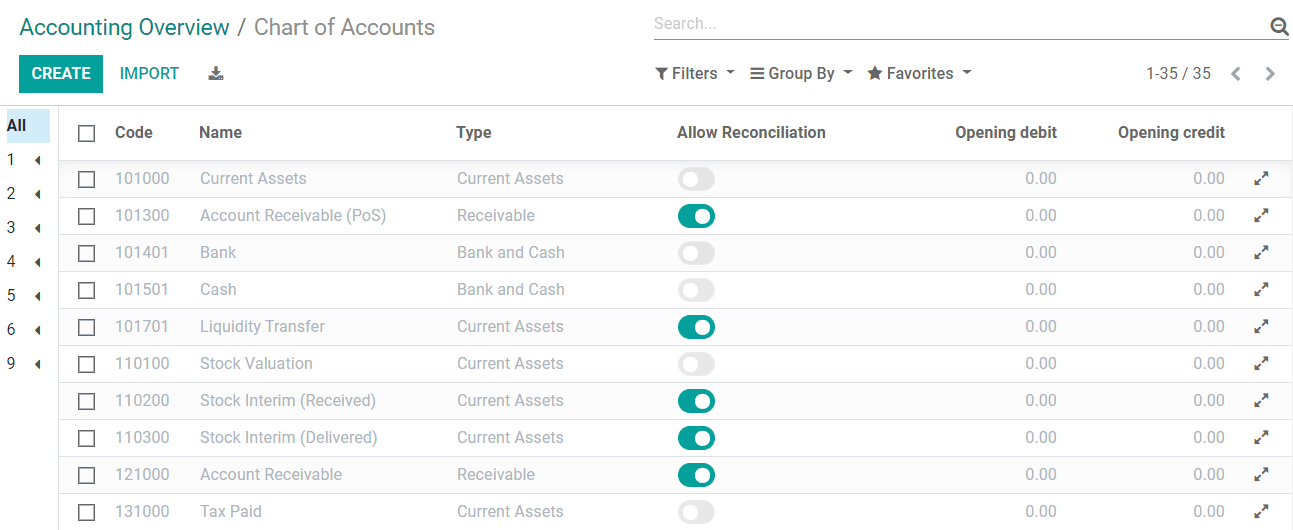开始使用¶
当你第一次打开 Odoo 会计应用时,会计仪表板 会通过一个逐步引导横幅欢迎你,这是一个帮助你开始使用的向导。此引导横幅会一直显示,直到你选择关闭它。
可以在入门横幅中看到的设置,稍后可以通过进入 进行修改。
注解
Odoo 会计会根据数据库创建时选择的国家自动安装相应的 财政本地化包,使您的公司能够直接使用合适的账户、报表和税项。单击此处 了解有关财政本地化包的更多信息。
会计期间¶
定义 会计年度 的开始和结束日期,这些日期用于自动生成报告,并设置您的 税务申报周期,同时设置提醒以确保不会错过任何税务申报截止日期。
默认情况下,开始日期设置为1月1日,结束日期设置为12月31日,因为这是最常用的设置。
注解
你也可以通过进入 来更改这些设置,并更新相关值。
银行账户¶
将您的银行账户连接到数据库,并实现银行对账单的自动同步。为此,请在列表中找到您的银行,点击 连接,并按照屏幕上的指示操作。
注解
点击此处 了解有关此功能的更多信息。
如果您的银行机构无法自动同步,或者您不希望将其与数据库同步,也可以通过输入其名称,点击 创建银行账户,并填写表单来手动配置您的银行账户。
名称:该银行账户的名称,在Odoo中显示的内容。
账户号码:您的银行账户号码(在欧洲为IBAN)。
银行: 点击 创建和编辑 以配置银行的详细信息。添加银行机构的 名称 和其 :guilabel:`标识代码`(BIC 或 SWIFT)。
代码:此代码是您账簿的 简称,如在 Odoo 中显示。默认情况下,Odoo 会使用此简称创建一个新的账簿。
日记账: 如果您已有未链接到银行账户的银行日记账,则会显示此字段。如果是这样,请选择您希望用于记录与此银行账户相关的财务交易的 日记账,或通过点击 创建并编辑 创建一个新的日记账。
注解
你可以通过进入 来使用此工具添加所需数量的银行账户。
点击此处 以了解有关银行账户的更多信息。
税项¶
此菜单允许您创建新税项、(停用/启用) 或修改现有的税项。根据您的数据库中安装的 地区化包,您国家所需的税项已预先配置。
注解
点击此处 了解有关税项的更多信息。
会计科目表¶
通过此菜单,您可以向您的**科目表**中添加账户,并设置其初始期初余额。
此页面上显示了基本设置,以便您查看您的会计科目表。要访问某项账户的所有设置,请点击该行末尾的 设置 按钮。

注解
点击此处 了解如何配置您的会计科目表的更多信息。
公司数据¶
添加您公司的相关信息,例如公司名称、地址、logo、网站、电话号码、电子邮件地址以及税务编号或增值税号。这些信息将显示在您的各类单据上,例如发票。
注解
你也可以通过进入 ,滚动到 公司 部分,并点击 更新信息 来更改公司的详细信息。
文档布局¶
自定义 默认发票格式。
注解
你也可以通过进入 ,滚动到 公司 部分,并点击 配置文档布局 来更改发票格式。
创建发票¶
创建您的第一张发票。
小技巧
在页脚中添加您的 银行账户号码 和 一般条款与条件 的链接。这样,您的联系人就可以在线找到您 GT&C 的完整内容,而无需在您开具的发票上打印它们。
在线支付¶
开始使用 Stripe,并在 Odoo 中启用安全的集成信用卡和借记卡支付。
小技巧
要使用其他付款提供商,请转到 发票 –> 配置 –> 付款提供商 并 启用所需的提供商。
另请参见
银行
入门/会计科目表
银行/银行对账
:doc:`本地化财政</s>

